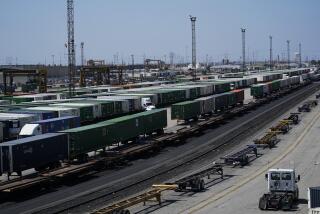Riverside County OKs Use of Sludge on Fields
Riverside County could soon be on the receiving end of tons of Southern California’s sewage sludge again.
Over strong protest from some residents, and praise from sewage treatment and compost industry representatives, the Riverside County Board of Supervisors voted unanimously Tuesday to allow spreading of Class A-type sludge on farm fields that may be near schools, homes and public roads. The measure has passed, but no contracts have been signed to begin to import sludge again.
“Based on past experience with Los Angeles, Orange and even San Diego counties shipping material here, we anticipate we may see large amounts again,” said Damian Meins, the county’s deputy environmental health director.
Treated human waste designated Class A must have all but trace amounts of certain disease-carrying bacteria removed, federal environmental regulations say.
Under the ordinance’s tiered system, based largely on odor intensity, the most highly treated, least odiferous material could be placed immediately next to schools and homes. Other Class A material could be placed no closer than 500 feet to half a mile of such facilities. All of it could be spread no closer than 100 feet from drinking water wells, and 50 feet from roads and property lines.
Southern California sewage processors, who say the material provides nutrients for farming, annually trucked hundreds of wet tons of less-regulated Class B sewage sludge to county farm fields until it was banned in 2001. Since then they have been forced to ship it to Arizona and elsewhere. Many are now upgrading their facilities to produce Class A material.
“Public health is not the paramount [worry] here,” said Gary Feldman, county public health officer, who said valid “nuisance” issues such as odor and flies would be adequately addressed by the new rules.
County staff hoped to have the program running by the end of the year at the latest, but details had yet to be worked out. Producers, truckers and farmers all will be required to undergo a stringent application process, inspection of the sludge and spot inspections if their applications are accepted.
Several county residents who live near fields where sludge had been spread in the past strongly disagreed about potential health risks, saying they and their children had suffered nosebleeds, stomach upsets and other ailments after breathing fumes.
More to Read
Sign up for Essential California
The most important California stories and recommendations in your inbox every morning.
You may occasionally receive promotional content from the Los Angeles Times.










